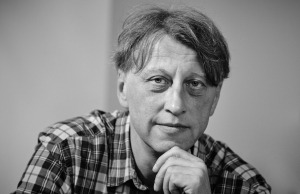The Vilenica jury consisting of Andrej Blatnik (president), Lidija Dimkovska (vice president), Ludwig Hartinger, Vesna Kondrič Horvat, Tone Peršak, Jutka Rudaš, Veronika Simoniti, Namita Subiotto, Špela Šramel, Aleš Šteger, Veno Taufer, and Jana Unuk awards the 2015 Vilenica International Literary Prize to Jáchym Topol.
From the laudation:
Jáchym Topol – About the city as a text and a post-apocalyptic world
Jachým Topol (1962) is a poet, prose writer, and journalist. He was born on 4 August 1962 in Prague, then the capital city of Czechoslovakia. He is the son of poet and playwright Josef Topol, brother of musician Filip Topol, and grandson of writer Karel Schulz. Until 1986 he – like older dissidents who were cast to the margins of society – was forced to work as a stocker and stoker, and was finally granted disability retirement after the faithful year of 1989. He signed the “Charta 77” (Charter 77) and was politically active as a member of the group České dětí (Czech children). In 1988 he was imprisoned for a short period of time for illegally crossing the border to Poland and for spreading prohibited anti-socialist propaganda materials. He studied Ethnology at the Faculty of Arts for a couple of years. He has been working as a freelance writer since 1991. During the period of the “underground,” he was active as the co-publisher ofRevolver Revue magazine, of which he was the editor-in-chief until 1993. He also worked on the respective editorial boards of the Respekt weekly and the Lidové noviny newspaper. He is the current programme director of the Václav Havel Library.
Alenka Jenstrle Doležal, Vilenica consultant
Foto: Ondrej Němec

